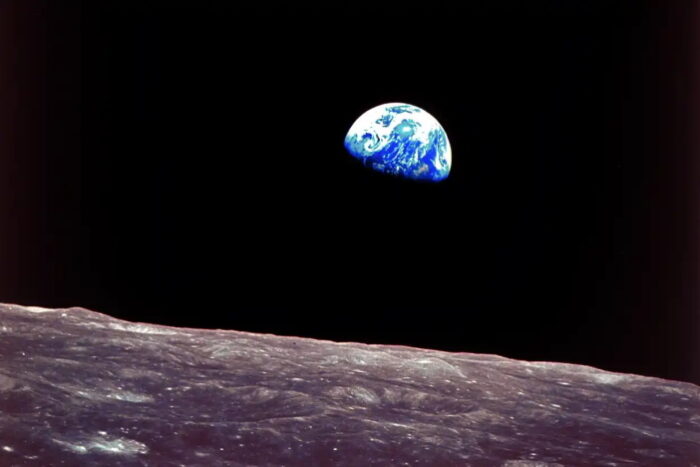
“It gained this iconic status, people realized that we lived on this fragile planet and that we needed to take care of it. This is the only home we have and yet we’re busy shooting at each other, threatening nuclear war, …it amazes me.” Bill Anders, December 24, 2018, (The Guardian)
Christmas Eve, 1968, in a TV broadcast back to earth the Apollo 8 crew signed off by reading from the book of Genesis: “In the beginning God created the heaven and the earth. …And God saw that it was good.”
There’s something about fog over a prairie slough,
the way it lies down and stretches
right over the cattails around the edges,
like a cotton compress over an open wound.
The world, the whole wide world,
needs such a fog, cleansing, healing,
then lifting, revealing new skin,
blue as a hatched bird’s belly
and shiny as a dolphin
breaching on a Pacific horizon,
under a rainbow scar.
It’s like what God had in mind, that business
with the flood. Major housecleaning.
Take everything away, God thought,
and they’ll come back wanting something different.
Lesson not learned, says
wildfire pandemic,
says ruthless economics.
Looks like we’ve mistaken our adolescence
for adulthood, and our Mother’s gifts for commodities,
appears we’ll manage our own decimation,
if not annihilation,
just fine.
We of the sputtering eidos; wicks
guttering out in the ornamental pools at the plaza;
we of the lost ethos, wandering about
like Carthusian monks in an airport.
Thankfully, there are those among us who still seek
directions; who make colour copies,
with tear-off phone numbers, of our lost planet —
that first photograph taken from space —
and staple them to street posts around town;
who send out doves, ravens, desert bats,
and wait for a fresh plucked olive leaf.
Mercifully, there are those among us who still live
for the sake of others, who rise every morning
to pay what we owe the child coming after us,
and so help the earth metabolize its grief
and restore to our once good globe
a portion of its peace and wildness.
It should put the lot of us on hold,
quieting our boats, listening anew for whale song,
quitting our combustion and turning around
to watch through scud clouds
for a flash of wing.

Stephen, your words are helping me to think in terms of what I can and do bring to the world. It is so easy to sink into something close to despair at the seemingly never ending losses. I feel them so viscerally. But you are right, I still labor to “restore to our once good globe a portion of its peace and wildness” and claiming that as the work I have been given to do, at this moment, feels centering and hopeful. I have a friend who does the same who once said, “Even if the end comes, let us be caught planting!” Thank you for the encouragement of your words on this hard morning, Stephen 🙂
Ann, I love, “…let us be caught planting.” Thank you for reading, and for your thoughtful and hopeful note.
Worlds of encouragement like this are important for us scientists working in the realms of climate change and conservation. May I share this in my climate course this fall? My colleague and I ask students to think of ways to communicate the issue of climate change – without all the scientific jargon, avoiding the partisanship, but using the arts to convey emotion. This is a wonderful example.
Thank you Diane, I had you in mind while I wrote this.
And yes, of course you can share this.
Ah shucks! Thanks for thinking of me and for your permission to share!
And oops – I meant “words” of encouragement.